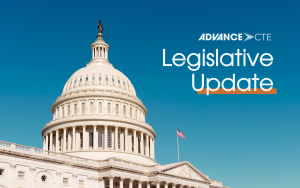 The Senate returned to Capitol Hill this past Tuesday following its annual August recess while lawmakers in the House are expected to return next week. Elsewhere, policymakers have started to collect ideas regarding how Artificial Intelligence (AI) will impact education and workforce development, while the U.S. Secretary of Education launches a back-to-school bus tour, announces educator diversity efforts and issues new guidance related to teaching and learning in schools.
The Senate returned to Capitol Hill this past Tuesday following its annual August recess while lawmakers in the House are expected to return next week. Elsewhere, policymakers have started to collect ideas regarding how Artificial Intelligence (AI) will impact education and workforce development, while the U.S. Secretary of Education launches a back-to-school bus tour, announces educator diversity efforts and issues new guidance related to teaching and learning in schools.
Senate Reconvenes for New Work Period
The Senate reconvened this week following its annual August recess. Lawmakers in the House are due back to Capitol Hill next week. On their return to Washington, D.C., the Senate has focused primarily on addressing Congress’s failure to complete work on the fiscal year 2024 (FY24) budget before the new fiscal year begins on October 1. Just before August recess, the Senate appropriations committee successfully advanced all 12 of the individual appropriations bills that compose the federal budget on a bipartisan basis but these proposals have yet to be approved by the full chamber and reconciled with forthcoming proposals in the House.
Lawmakers in the House, meanwhile, have been unable to similarly advance their own spending proposals, including legislation providing funding for Career Technical Education (CTE) via the Carl D. Perkins Career and Technical Education Act (Perkins V*). More importantly, the House and Senate’s proposed funding levels for FY24 differ substantially, with lawmakers in the lower chamber proposing significant cuts to federal spending which do not conform to the Fiscal Responsibility Act (FRA)—a legislative agreement reached earlier this year that prevented a default on the nation’s debt obligations.
Stopgap legislation, known as a continuing resolution (CR), will likely be needed to avert a government shutdown when the new fiscal year begins later this month. Federal lawmakers are continuing to negotiate a path forward. Conservative lawmakers in the House recently issued a series of policy and spending demands in exchange for their support for any CR, including prioritizing spending levels that fall well below those required by the FRA. House Republicans, led by Speaker McCarthy (R-CA), have further indicated that they want a shorter-term CR rather than one lasting through the end of the year while the Senate and the Biden Administration want a temporary funding extension lasting until the holiday season to provide more time to negotiate a full-year appropriations package.
Given the significant differences between the House and Senate FY24 spending proposals and the positions currently taken by the House, Senate, and the White House, negotiations are expected to be extremely contentious in the coming weeks and months ahead. As these talks move forward, Advance CTE will continue to advocate for robust funding for critical funding streams important to the CTE community. Be sure to let your Senators and Representatives know how important CTE funding is by clicking here!
Ranking Member Cassidy Issues Request for Information on AI
On September 6, Senate Health, Education, Labor, and Pensions (HELP) Committee Ranking Member Cassidy (R-LA) published a new white paper on artificial intelligence and the potential implications for policy areas falling under the HELP Committee’s jurisdiction. AI is still an emerging topic for Congress with two hearings scheduled next week in the Senate within the Judiciary and Commerce Committees.
Ranking Member Cassidy has requested feedback from the public and stakeholders regarding several issues likely to arise in the coming years as AI is further deployed and leveraged in different facets of daily life, including in education and workforce development. Specifically, the Ranking Member seeks feedback on whether and how AI can be used in educational settings, how education leaders promote a better understanding of AI, both among students and their peers, and how these technologies can be used to improve student learning while not diminishing learners’ critical thinking skills. Notably, the white paper includes several questions related to whether and how CTE systems and programs can leverage AI and provide learners more opportunities to pursue pathways in related fields.
ED Launches Back to School Bus Tour
U.S. Secretary of Education Miguel Cardona has been on a “Back to School Bus Tour 2023: Raise the Bar”—a week-long multi-state trip across the nation to highlight the work schools, districts, institutions, and states are doing to support students as they collectively return to classrooms over the next few weeks. The tour includes stops in Kansas, Missouri, Illinois, Wisconsin and Minnesota and features priorities and initiatives that the agency has been promoting throughout the Biden Administration, including its “Career Connected High School” efforts which are intended to promote key pillars of high-quality CTE. More information about the tour can be accessed here. In addition, the Department also recently published a factsheet highlighting the Biden Administration’s ongoing efforts to support learners as they return to school this fall.
ED Announces Educator Diversity Efforts
The U.S. Department of Education (ED) has announced that it will host two convenings in late October to find, promote and encourage wider educator diversity efforts. The first of these national meetings will be a Conference on Equity in Opportunity and will be held in Denver October 26-27. The second meeting, the Teach to Lead Summit, will take place in Denver on October 27. The announcement also highlighted recent ED efforts to prioritize teacher diversity including through investments in teacher quality partnership grants, August Hawkins Centers of Excellence programs, and the Supporting Effective Educator Development. More information can be found here.
Office of Civil Rights Issues New Guidance on Race and School Programming
Late last month, ED’s Office of Civil Rights (OCR) issued new guidance regarding how and in what ways schools may include programming aimed at fostering racially inclusive communities. The guidance updates OCR’s legal interpretation of Title VI of the Civil Rights Act of 1964 which provides further clarity regarding under what circumstances schools may develop curricula and provide programs that promote racially inclusive school communities. “Today’s resource shares with school communities practical guidance about whether and when federal civil rights laws permit – and in some cases require – schools to take actions related to race, as well as whether and when these same laws may require that schools not act based on race,” said Assistant Secretary for Civil Rights Catherine E. Lhamon during the release of this guidance. The full letter can be accessed here.
*As amended by the Strengthening Career and Technical Education for the 21st Century Act

